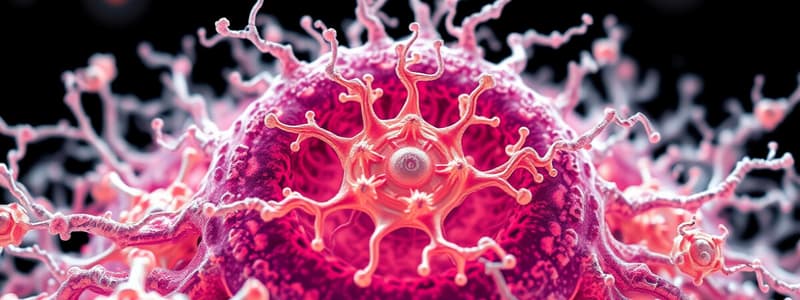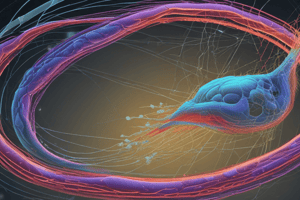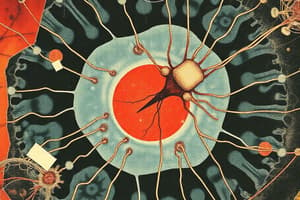Podcast
Questions and Answers
What primary role does the cytoskeleton serve in cells?
What primary role does the cytoskeleton serve in cells?
- To store genetic information
- To produce proteins for cellular functions
- To provide energy for cellular activity
- To give cells shape and enable movement (correct)
Which protein is primarily associated with actin filaments?
Which protein is primarily associated with actin filaments?
- Collagen
- Tubulin
- Actin (correct)
- Keratin
Microtubules are composed of which type of protein?
Microtubules are composed of which type of protein?
- Actin
- Keratin
- Elastin
- Tubulin (correct)
What is a function of intermediate filaments within the cytoskeleton?
What is a function of intermediate filaments within the cytoskeleton?
How do cells change their shape?
How do cells change their shape?
What staining method can be used to detect cytoskeletal proteins?
What staining method can be used to detect cytoskeletal proteins?
Which of the following is NOT a component of the cytoskeleton?
Which of the following is NOT a component of the cytoskeleton?
What cellular functions are regulated by the cytoskeleton?
What cellular functions are regulated by the cytoskeleton?
What is the primary purpose of using secondary antibodies in immunofluorescence?
What is the primary purpose of using secondary antibodies in immunofluorescence?
What color would you expect to see in a microscope when visualizing microtubules labeled with a green fluorescent dye?
What color would you expect to see in a microscope when visualizing microtubules labeled with a green fluorescent dye?
Which of the following is NOT true about primary antibodies used in immunofluorescence?
Which of the following is NOT true about primary antibodies used in immunofluorescence?
What does the term 'immunofluorescence' specifically refer to?
What does the term 'immunofluorescence' specifically refer to?
If an antibody against tubulin is labeled with red fluorescent dye, what would the red color indicate in a microscopic view?
If an antibody against tubulin is labeled with red fluorescent dye, what would the red color indicate in a microscopic view?
Which of the following denotes the role of fluorescent dyes in immunofluorescence?
Which of the following denotes the role of fluorescent dyes in immunofluorescence?
When using fluorescent microscopy, which of the following representations is correct for detecting DNA?
When using fluorescent microscopy, which of the following representations is correct for detecting DNA?
What is one disadvantage of directly labeling primary antibodies in immunofluorescence?
What is one disadvantage of directly labeling primary antibodies in immunofluorescence?
How can actin filaments be distinguished from microtubules in a microscopy setup?
How can actin filaments be distinguished from microtubules in a microscopy setup?
What is the function of cytoskeletal filaments?
What is the function of cytoskeletal filaments?
What happens if cytoskeleton dynamics are blocked?
What happens if cytoskeleton dynamics are blocked?
What is the role of nucleation in filament formation?
What is the role of nucleation in filament formation?
What are the building blocks of actin filaments?
What are the building blocks of actin filaments?
Which characteristic distinguishes the three types of cytoskeletal components?
Which characteristic distinguishes the three types of cytoskeletal components?
What primary role do microtubules play during cell division?
What primary role do microtubules play during cell division?
Which component of the cytoskeleton is primarily responsible for providing mechanical strength against shear stress?
Which component of the cytoskeleton is primarily responsible for providing mechanical strength against shear stress?
Which cytoskeletal structure is involved in the movement of organelles like mitochondria within the cell?
Which cytoskeletal structure is involved in the movement of organelles like mitochondria within the cell?
During which process does the actin cytoskeleton play a major role?
During which process does the actin cytoskeleton play a major role?
How does the cytoskeleton contribute to muscle contraction?
How does the cytoskeleton contribute to muscle contraction?
What role do actin filaments play in the structure of microvilli?
What role do actin filaments play in the structure of microvilli?
What feature of the cytoskeleton allows it to respond to stretching in epithelial tissues?
What feature of the cytoskeleton allows it to respond to stretching in epithelial tissues?
Which property of white blood cells is directly influenced by the cytoskeleton?
Which property of white blood cells is directly influenced by the cytoskeleton?
What is the relationship between mitosis and cytokinesis?
What is the relationship between mitosis and cytokinesis?
Which cytoskeletal component is NOT involved in shaping the cell surface?
Which cytoskeletal component is NOT involved in shaping the cell surface?
What is the primary purpose of using GFP in the context of fluorescent microscopy?
What is the primary purpose of using GFP in the context of fluorescent microscopy?
How can researchers track actin dynamics using fluorescent microscopy?
How can researchers track actin dynamics using fluorescent microscopy?
What does the term 'recombinant protein' refer to in the context of fluorescent microscopy?
What does the term 'recombinant protein' refer to in the context of fluorescent microscopy?
What is the function of phalloidin in the study of actin?
What is the function of phalloidin in the study of actin?
Which of the following is a characteristic of indirect fluorescent microscopy?
Which of the following is a characteristic of indirect fluorescent microscopy?
Which type of fluorescent protein can be used as a tag alongside actin in microscopy?
Which type of fluorescent protein can be used as a tag alongside actin in microscopy?
What occurs during the process of creating a fusion protein with a fluorescent tag?
What occurs during the process of creating a fusion protein with a fluorescent tag?
What is a potential drawback of using direct fluorescent microscopy?
What is a potential drawback of using direct fluorescent microscopy?
Which dye would emit green light when bound to actin?
Which dye would emit green light when bound to actin?
What is the arrangement of components in a bipolar mitotic spindle observed via fluorescent microscopy?
What is the arrangement of components in a bipolar mitotic spindle observed via fluorescent microscopy?
Flashcards are hidden until you start studying
Study Notes
Cytoskeleton Overview
- The cytoskeleton consists of actin filaments, microtubules, and intermediate filaments, playing a crucial role in cell shape, movement, and division.
- It regulates diverse cellular functions such as polarization, migration, and proliferation.
- Cytoskeletal proteins can be visualized using Coomassie blue dye, demonstrating their filamentous structures.
Types of Cytoskeletal Filaments
- Actin filaments (microfilaments) are composed of the protein actin, essential for cell shape and movement.
- Microtubules consist of tubulin and are vital for maintaining cell structure and chromosome separation during mitosis.
- Intermediate filaments are formed from various proteins and provide mechanical strength.
Visualization Techniques
- Immunofluorescence microscopy can detect actin and tubulin using antibodies specific to each protein.
- Primary antibodies recognize target proteins while secondary antibodies, often labeled with fluorescent dyes, amplify detection.
- Direct fluorescence microscopy involves tagging proteins with fluorescent proteins (e.g., GFP) for real-time observation of cytoskeleton dynamics.
Mitosis and Cytoskeleton
- The mitotic spindle, composed of microtubules, is crucial for chromosome separation during mitosis.
- Cytokinesis, the division of the cytoplasm, relies on the actin cytoskeleton to form the contractile ring.
Cytoskeletal Functions
- Supports intracellular traffic of organelles like the Golgi apparatus and endoplasmic reticulum (ER) via actin.
- Maintains the stability and shape of the plasma membrane, enabling functions such as endocytosis.
- Provides mechanical linkage to withstand stress, allowing cells to respond to physical stretching and shear stress, particularly in endothelial cells.
- Plays a vital role in cell migration, essential for immune response, and in muscle contraction via interactions between actin and myosin.
Cell Protrusions and Stability
- Microvilli, supported by actin filaments, are crucial for increasing surface area in epithelial cells of the digestive system.
- The positioning of organelles like mitochondria is determined by microtubules, which facilitate their movement within the cell.
Coloring and Labeling
- Fluorescent dyes (e.g., Rhodamine, fluorescein) can be conjugated to phalloidin, allowing specific visualization of actin filaments.
- Different dyes emit distinct colors, allowing simultaneous detection of multiple components within the cell.
Summary of Cytoskeletal Components
- Intermediate filaments provide mechanical strength against stretching and shear stress.
- Microtubules position organelles and enable intracellular transport.
- Actin filaments define cell shape and are critical for motility and the formation of structures like microvilli.### Role of Intermediate Filaments
- Intermediate filaments provide mechanical resistance to cells.
- They are interconnected through specific connecting proteins at cell interfaces.
- These connecting proteins, described as "protein buttons," anchor cells together, creating a mechanical structure.
Dynamics of Cytoskeletal Filaments
- Cytoskeletal filaments offer structural integrity but are inherently dynamic and not stable.
- They continually undergo remodeling, forming and disassembling while fulfilling their cell functions.
- Disruption of cytoskeleton dynamics, such as through drug intervention, can lead to cell death.
Actin Filaments and Cytoskeleton Dynamics
- Actin filaments are critical for maintaining cell structure; blockage by agents like phalloidin disrupts dynamic processes.
- All cytoskeletal filaments feature a stable structure, but this structure changes over time due to continuous remodeling.
Composition of Cytoskeletal Filaments
- Each filament type consists of specific smaller protein subunits:
- Actin filaments are made of actin proteins.
- Microtubules are composed of tubulin.
- Intermediate filaments consist of various proteins.
- Filaments are elongated structures made up of chains of globular protein subunits.
Nucleation Process
- Nucleation is the essential first step in filament formation, involving the interaction of initial subunits.
- Formation of a nucleus, where a few subunits (typically three) come together, is crucial for retaining structure.
- Following nucleation, additional subunits attach to elongate the filament.
Mechanical Properties of Filaments
- Each cytoskeletal filament type displays distinct mechanical properties and dynamics.
- While all filament types are dynamic, they exhibit different behaviors and response patterns in the cell.
Studying That Suits You
Use AI to generate personalized quizzes and flashcards to suit your learning preferences.




